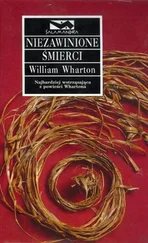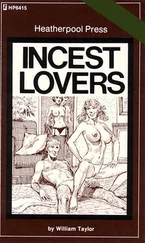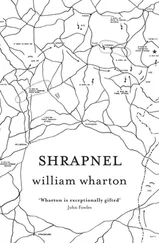WILLIAM WHARTON
Last Lovers

To my wife, Rosemary
This tale takes place
between April and November 1975.
Location: Paris, France.
Believing is seeing.
—W.W.
Table of Contents
Title Page WILLIAM WHARTON Last Lovers
Dedication To my wife, Rosemary
Epigraph This tale takes place between April and November 1975. Location: Paris, France. Believing is seeing. —W.W.
Chapter 1
Blind Reverie
Chapter 2
Blind Reverie
Chapter 3
Blind Reverie
Chapter 4
Blind Reverie
Chapter 5
Blind Reverie
Chapter 6
Blind Reverie
Chapter 7
Blind Reverie
Chapter 8
Blind Reverie
Chapter 9
Blind Reverie
Chapter 10
Blind Reverie
Chapter 11
Blind Reverie
Chapter 12
Reverie
Chapter 13
Also by William Wharton
Copyright
About the Publisher
ZAMBO!! Suddenly I’m on my hands and knees down on the asphalt next to a bench near the statue of Diderot in the small Place beside the boulevard Saint-Germain, across from the Church of Saint-Germain-des-Prés.
My precious thirteen tubes of paint are scattered all over the place. My prize easel, my hundred-franc easel I bargained for in the Marché Aligre, is knocked all galley-west with one leg bent under and another splayed out like a spavined camel trying to stand up in a windstorm.
Shit! This is just what I didn’t need. I’m still holding a paintbrush in my hand, the top of it is snapped off about three inches above my knuckle. Luckily the canvas landed with the painting side up, so it could be worse.
Then I notice. There’s an old lady all dressed in red on her knees beside me. We must look like two elderly clochards chasing after the same butt someone just flipped. My first reaction is, this whole thing is her fault; why the hell doesn’t she look where she’s going?
So, still on my knees, trying to ignore her, I start scooping the tubes of paints toward me, before some other idiot steps on one of them. That’d be a real mess, colored footsteps tromping through the Latin Quarter, yellow, green, alizarine crimson. I scramble over to pick up my canvas and lean it against the bench, no serious damage I can see. Next time I’ll cozy myself up in the lee of that bench, safe from kooky old gals wearing red costumes.
Then, finally, I go over. She’s swung herself around and is sitting on her duff rubbing one knee. Both her stockings are ripped where she hit the ground. One knee is bleeding and she’s licking her finger and rubbing it, the way a cat would. But she’s not looking at her knee. She’s looking at me .
‘Est-ce que vous êtes peintre, monsieur, artiste-peintre?’
What the hell else does she think I am, a surveyor taking measurements of Saint-Germain-des-Prés so we can make a copy and build it out in the desert for some Arab prince to convert into a mosque? Hey, maybe they’d let me house my chevalet there, a horse turned camel. The French call easels chevalets for some reason, sounds like something to do with horses, at least to my semiliterate French-American ear.
I lean down and try straightening my box up, lengthening the collapsed rear leg, slowly twisting one side leg that’s sticking out all cockeyed. Nothing seems to be broken, thank God. It could just possibly end my budding career as artist. Maybe that’s ‘grafted’ career, more accurate, probably.
‘Oui, madame, je suis peintre, artiste-peintre.’
‘Ah, and you are American, too. That’s very interesting.’
Then I see the cane. It’s white. I feel like a real asshole. It’s the kind of insensitivity, unawareness, that’s my greatest problem. I get down on my knees again beside the old lady.
‘Est-ce que je peux vous aider?’
She seems to look right through me. I realize only then she’s spoken in perfect, practically unaccented English-English.
‘Ah, ha, you have seen my cane. I can tell by the change in your voice. Yes, you may assist me. Would you help me pull myself to my feet? If I try getting up myself, I shall need to roll onto my knees again and that would be rather painful.’
She stretches out her hands. They’re small and smooth. I gently pull her to her feet. Actually, she more pulls herself up, using my hands as support. She has strong arms for an old gal.
I lean over, pick up her cane, give it to her. She brushes herself off, all over, not knowing where she’s dirty, with the thoroughness of a blind person. Then she starts swinging her cane in arcs around her, close to the ground, like a radar scanner or somebody hunting for money at a beach with a metal detector.
I see what she’s looking for, a purse, more like a satchel, about two yards nearer the church. I go over and pick it up. I step inside the radar sweeps and touch her hand, push the leather straps of the satchel out so she can grab them.
‘Ah, sir. Sometimes it is difficult being blind. Thank you for your kindness. I am very sorry I bumped into you. Or should that be crashed? Anyway, I am sorry. You see, I have my little private paths where there is the least chance I will stumble into anything or anyone, and you were in the middle of one; I did not expect you, you fooled me.
‘You must work very quietly, monsieur, or I would have heard you. Of course, there is the noise of automobile traffic out there.’
She waves her cane at the boulevard Saint-Germain.
‘But I should have smelled you, at least, the wonderful smell of turpentine. I should have smelled that. Yes, I must be getting old, it is hard to realize.’
‘Perhaps the wind was blowing the wrong way.’
She leans back, smiles, looks me in the eye, that is, if a blind person can look someone in the eye.
‘Ah, an American, an American painter, with a sense of humor. This is very interesting. It is something I did not expect, a pleasant surprise. There do not seem to be very many pleasant surprises left in this life.’
I notice then she isn’t completely in red, not anymore, anyway. She is wearing a red pillbox hat, the kind Jackie Kennedy was wearing in Dallas, only red, not pink; a bright Santa Claus-red skirt, sweater, and coat. But now the coat is well dabbed with several colors from my palette. It must have brushed against her in the cataclysm, bump, crash, or collision; whatever it was.
‘Excuse me, madame, but there is paint on your coat. If you would stand still I can take it off now with my turpentine. If I don’t, and it dries, it will stay there.’
‘Is it a good design, the paint on my coat? If so, I should like it to remain. It would be lovely having a hand-painted coat, painted by an American artist here in Paris, n’est-ce pas? Even though I could not see it, would it not be exciting?’
‘I’m afraid, madame, it is only a smear of burnt sienna, yellow ocher, alizarine crimson, and a touch of ultramarine. Even in the Salon de Mai it would not be considered much of a composition.’
I’m not usually so flip, so verbal. Perhaps it’s because I don’t get to speak much English these days and I’m enjoying the freedom of my own language, but I think it’s the nature of this woman, the situation. I want to continue our wordplay, our game, practically a flirtation.
Or maybe it’s because I sense she’s lonely, too, wants to talk with someone, practice her English.
‘Then perhaps, monsieur, it would be best if I take off the coat so you can obliterate, transform, or remove your work of spontaneous art. At least, then I shall have the smell of turpentine following me around for a day or two, a souvenir of our meeting. I think I should like that.
Читать дальше













